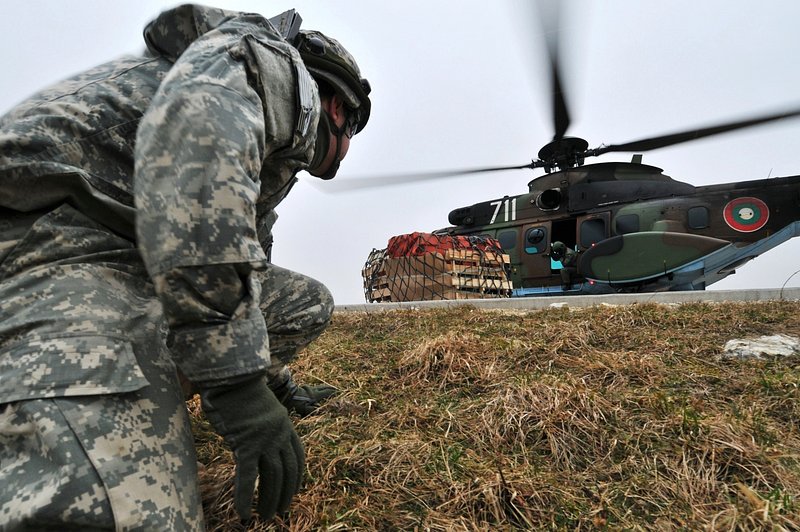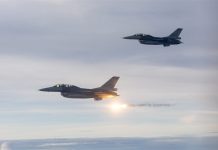The pilots of the Northern Fleet’s Mixed Air Corps etched their names in history by setting remarkable records in the Arctic, according to the Russian state-owned media outlet TASS, citing the fleet’s press service.
The achievements of the pilots of the Northern Fleet’s Mixed Air Corps — recently disclosed after a meeting of the Military Council led by corps commander Lieutenant General Alexander Otroshchenko — have been officially recognized and included in the prestigious Book of Records of the Armed Forces of the Russian Federation.
The feats, achieved in August 2023, signify a significant leap forward in Russia’s capabilities and strategic positioning in the Arctic region.
The report pointed out that one remarkable milestone was the historic first flight of naval fighter aircraft, Su-33s, to airfields situated on the islands of the Arctic Ocean.
The mission not only validated the feasibility of deploying fighter aircraft to Arctic airfields but also demonstrated the potential for safeguarding the facilities of the Russian Armed Forces across the Arctic latitudes and the vital Northern Sea Route.

Along with this success, the same period witnessed another milestone as crews of Su-33 aircraft, for the first time in history, assumed combat duty, taking off from the Rogachevo airfield situated in the Novaya Zemlya archipelago, and the Nagurskaya airfield located in the Franz Josef Land archipelago.
The Northern Fleet said that this achievement served as a testament to the reliability of the aircraft and the proficiency of the pilots in executing critical missions within the challenging environment of the Arctic Ocean islands.
In recognition of their exceptional accomplishments, the commander of the ship’s fighter aviation regiment of the Northern Fleet was awarded a certificate of inclusion of the unit’s achievements in the esteemed Book of Records of the Armed Forces of the Russian Federation.
Discussions during the Military Council meeting also revolved around pertinent issues concerning the maintenance of combat readiness within the aviation units.
The emphasis placed on ensuring the continued preparedness of these units underscores the strategic importance attributed to the Arctic region and the ongoing efforts to bolster Russia’s military capabilities in this crucial area.
Russian Presence Increasing In The Arctic
With these achievements, Russia seeks to solidify its position as a key player in the increasingly strategic and contested Arctic domain. The region, with its shrinking ice cap opening up new sea lanes and resources, is experiencing profound changes.
Russia has intensified its strategic foothold in the region. Today, it boasts a formidable network of military bases surpassing the combined total of those operated by the US and NATO.
Since 2005, Russia has embarked on a campaign to revive and modernize Soviet-era military bases across the Arctic, as reported by Reuters.
This extensive effort has been complemented by the modernization of its navy and the development of cutting-edge hypersonic missiles, positioning Russia as a dominant force capable of countering US sensors and defenses.
In a recent development, Moscow decided to bolster its Arctic capabilities by deploying specialized Railway Troops under the Northern Fleet.

This move aims to expedite the mobilization of weaponry, troops, and logistical support across the challenging Arctic terrain, further enhancing Russia’s operational readiness in the region.
These strategic maneuvers come amidst growing concerns over NATO’s expansion, particularly with Finland’s recent accession and ongoing endeavors by Sweden to join the alliance. The Kremlin’s efforts to fortify its Arctic infrastructure serve as a proactive response to perceived encroachments by Western powers.
Also, Russia has forged a strategic partnership with China to develop infrastructure along the Northern Sea Route, a key shipping lane across the Arctic. This collaboration, announced in 2023, underscores the convergence of economic interests between Moscow and Beijing in the polar region.
In contrast, experts highlight the lag in the West’s military presence in the Arctic, trailing behind Russia by approximately a decade. The effectiveness of the US military in Arctic operations faces obstacles due to several factors.
According to a 2023 report from the American think tank, the RAND Corporation, one of the primary challenges is the scarcity of assets and infrastructure available for operations in the region, especially compared to Russia’s substantial resources.
Russia’s dominance in the Arctic is further exemplified by its substantial fleet of over 50 polar icebreakers, dwarfing the US fleet, which currently stands at only two. Plans for expansion are underway.
Meanwhile, Canada is contemplating the acquisition of nuclear submarines to safeguard its Arctic coastline, with Prime Minister Justin Trudeau signaling his intentions to explore modern submarine options to bolster Canada’s Arctic defense capabilities.
Trudeau also confirmed Canada’s plans to join the AUKUS military alliance (AUKUS, formed by three countries in 2021—the US, the UK, and Australia—is a trilateral security partnership for the Indo-Pacific region) to bolster security and defense cooperation in the region.
- Contact the author at ashishmichel(at)gmail.com
- Follow EurAsian Times on Google News




